Most of us have the occasional bout with overspending, but it can have a significant impact on your finances when it happens regularly. Small impulse buys that add up or spending large sums of money you don’t exactly have can lead to some serious consequences.
For us, it was small insignificant purchases that added up over the month, mostly eating out and impulse buys at the grocery store. This constant overspending took away from our financial goals, like paying off debt and saving for our emergency fund.
But, we really didn’t realize how big of a problem it was until we were hit with three huge unexpected expenses, all within three months of each other. Our overspending caused us to not have enough money when we needed it in an emergency, living paycheck to paycheck, more debt, and financial stress.
The negative consequences of overspending can wreak havoc on your finances, including unbearable debt, financial stress affecting your mental health, living paycheck to paycheck, and even financial infidelity.
So, today we’re going to discuss why overspending happens, dive deeper into the consequences of overspending, and how to get yourself out of a potentially dangerous financial situation.
Disclaimer: This post may contain affiliate links. This means I receive a small commission, at no extra cost, if you purchase using the links below. Please see my earnings disclaimer for more details.
Table of Contents
Reasons for overspending
So, if you consistently overspend each month, it’s important to understand why. Most likely, you’re doing at least one of these things.
You don’t have a budget
Budgeting is the key to financial success! It’s the most important thing you should be doing to manage your money. Without a household budget, most of us spend our paychecks as soon as the money hits our bank accounts.
This mindless spending usually means a lot of overspending, which leaves us broke at the end of the month.
A budget gives every dollar of your income a job and a place. You know exactly where your money is going. Therefore, you’re less prone to overspending and more likely to reach your financial goals like paying off your credit cards or saving money.
Trying to keep up with the Joneses
In today’s world, with the constant stream of social media ads and posts of people’s “perfect lives,” it’s hard not to compare yourself, your family, and life to someone else’s bogus social media feed.
Comparing ourselves and trying to impress or “keep up” with people on social media apps can lead to ridiculous overspending to make ourselves feel better. This type of overspending is stupid and can be really dangerous to your financial well-being.
And sadly, it happens more often than we care to believe. We always want more and a quick fix to our problems, which usually requires money we don’t have.
My favorite quote is by Dave Ramsey “It’s time to stop buying things we can’t afford with money we don’t have to impress people we don’t like.”
Read that again! You don’t have to like Dave Ramsey for this quote to resonate.
We’ve all done it…compared our lives to someone else’s, gave in to social pressure, and spent money we didn’t really have to try to “keep up.” Let’s stop doing this because it can cause overspending and, even worse, lead to so much debt.
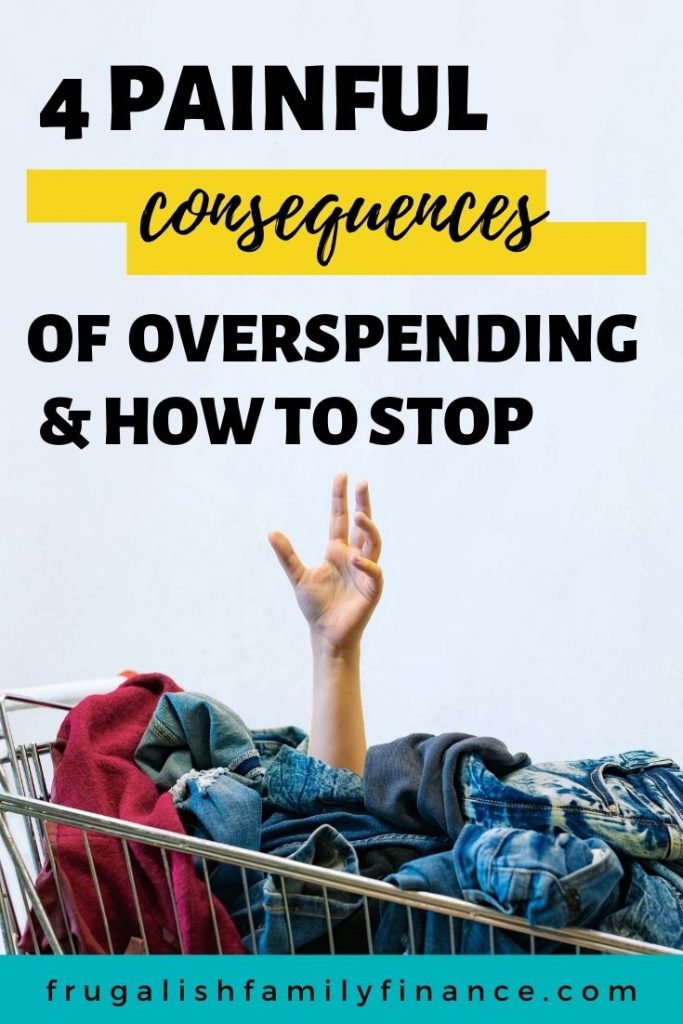
No financial goals
Overspending happens when you don’t have financial goals. When you don’t have plans for your money, you don’t know what to do with it, so you spend it.
This mindless spending means you’re living paycheck to paycheck or close to it.
Planning for your future with fail-safes like retirement savings, emergency funds, and children’s education funds ensures you will stay financially stable.
Entitled spending
Another reason we overspend is that we have an entitled mindset. We think we should be rewarded for doing the most basic life tasks imaginable.
Now don’t get me wrong, we all deserve to treat ourselves! You worked hard and cut your budget to pay off that credit card; go treat your family to a celebration dinner. But, you don’t deserve a brand new car you can’t really afford just because you work a full-time job.
We all do it! I bought a brand-spankin’ new hardtop convertible as a reward for graduating nursing school. I wasn’t even working yet, and was making a $500 monthly car payment! And this was the start of a very rocky financial road I traveled.
There is a difference between working hard to reach your goals and treating yourself versus spending because you think you deserve it. This entitled spending gets fuzzy and can lead to financial problems.
Negative consequences of overspending
Overspending can lead to more than just a little guilt because you went a smidge over budget. Chances are you may be experiencing one or more of these significant consequences of overspending if it happens consistently.
Debt
When you continuously overspend, you probably don’t have the money to cover the cost of your overspending. If you’re spending money you don’t have, it ends up as debt.
According to CNBC, the average millennial carries a credit card balance of $4,651, and they have a total average of $27,251 in non-mortgage consumer debt, which includes credit cards, student loans, car loans, and personal loans.
Having a revolving balance on your credit card basically means you’re stealing from your future income.
You’re already behind the next month when you carry a balance from month to month because you’re making payments for past overspending.
I remember paying the minimum on all my credit cards, and there was just nothing left over to pay any of them down. The interest rates were killing me, and I could never get ahead because I was always paying for my past mistakes.
It’s a vicious cycle that can quickly become unmanageable and overwhelming, especially with higher interest rates.
Financial stress
Not having money to cover your monthly expenses or having debt you can’t manage can cause overwhelming financial stress.
According to the Mind Over Money study done by Capital One and The Decision Lab, 77% of the Americans surveyed reported feeling anxious about their finances. Furthermore, the same study revealed that 58% of the people surveyed felt that their finances controlled their lives.
On top of that, a study done by Ramsey Solutions showed money is the number one thing married couples argue about, and it’s the second leading cause for divorce.
Before Doug and I learned how to manage our money, it was the thing we fought about the most.
Our credit card debt, student loans, and rental house were a huge financial burden that impacted our marriage almost daily.
Living paycheck to paycheck
Constant overspending leaves you living paycheck to paycheck. When you are always waiting for the next payday, you most likely have no money left over to contribute to your future wealth.
When you live paycheck to paycheck, you’re unable to:
Handle emergency expenses
Recent research done by Bankrate, over half of Americans can’t afford to cover a $1000 emergency if it happens.
When we can’t contribute to emergency fund savings, we are left dependent on credit card debt and personal loans, perpetuating the vicious cycle of debt.
Pay off debt
You pay only the minimum payments because you don’t have extra money to pay down your debt. This leaves you with a revolving balance that you’re paying interest on.
Furthermore, this debt steals from your next month’s income and leads to possibly using more debt to cover your monthly expenses.
Reach financial goals
Overspending leaves little room to reach the financial goals you want to achieve.
Whether you’re saving for a down payment for a house or your future retirement, living paycheck to paycheck will stunt your financial growth.
Financial Infidelity
Overspending can lead to financial infidelity in your relationship due to shame or lack of communication.
Doug knew I had debt when we married, but I was never truthful about how much I had and didn’t quit using my credit cards either.
I hid my debt and some of my credit cards because I was ashamed, but I didn’t think I was basically cheating on my husband with my credit cards.
It wasn’t until later that I found out he actually felt this way too.
You may think financial infidelity is the big acts of mistrust like hiding a secret account or gambling away money. But, it includes the more minor offenses as well, such as:
- Hiding purchases from your partner
- Lying about the price you pay for something
- Opening a credit card without telling your spouse
- Lying to cover up debt
Financial infidelity can lead to mistrust, financial distress, and possibly divorce.
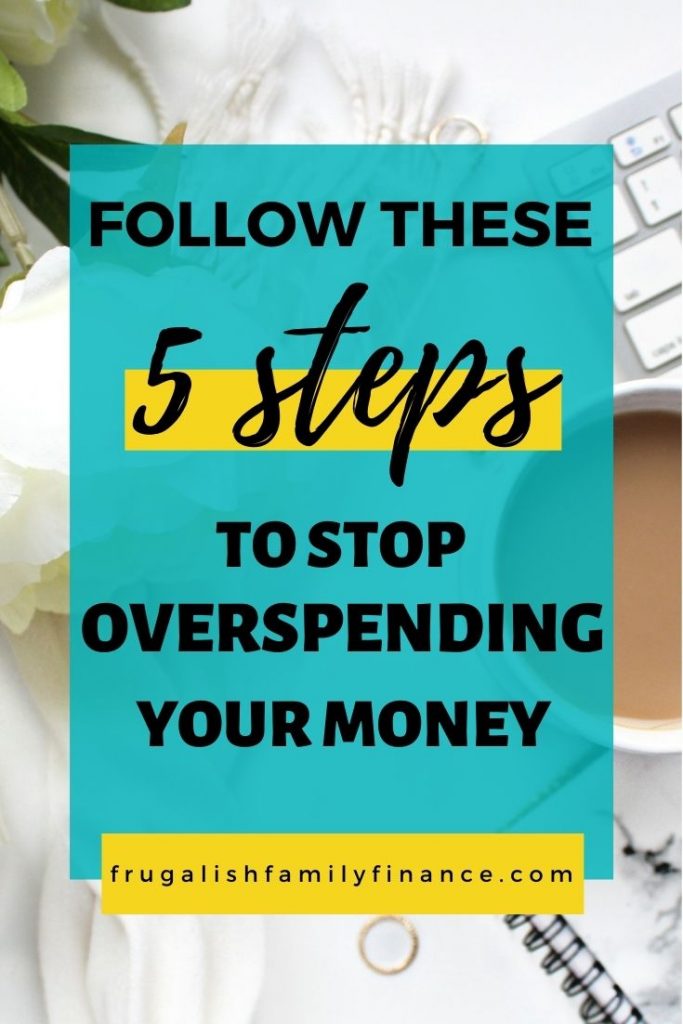
How to stop overspending money
Stopping your overspending can be challenging, but it can be done. Here are the 5 steps to stop overspending your money.
Assess the damage
Avoiding your overspending will not make it go away. You need to sit down and visualize how bad the overspending has been and what damage has been done.
Print out bank statements and study your spending. This will help you see what kind of spending habits you have. Are you an emotional spender, impulse buyer, looking for a quick fix to something, or trying to impress someone? Then, stop the spending!
And if you have debt, you need to deal with it. Make a plan to pay it off so that it doesn’t become an issue in the future.
Create a budget
You have to make a plan for your money every month. This is essential if you want to live a financially stress-free life. Here are four quick steps to get you started with a monthly budget.
Monthly income
List all your income for the month.
Monthly expenses
List all your monthly expenses, starting with the essential budget items, such as housing, utilities, and groceries.
Then, list out the non-essential budget items, such as gym membership, streaming subscriptions, and cable. Listing your expenses this way will make it easier to see what you need to cut.
Find the difference
Subtract your expenses from your income and find the difference.
If you have money left over, make a plan for where you want it to go (ie: pay off debt, save for your emergency fund, or put into retirement).
If you don’t have enough to cover your monthly expenses, go through your non-essential budget items and see what you need to cut to make your budget work.
Track your spending
Keep track of your spending as you spend it to ensure you’re staying on budget.
Related:
How To Create A Zero-Based Budget To Simplify Your Finances
12 Reasons Why Budgets Fail And How To Fix It
12 Important Reasons And Benefits Of Tracking Your Expenses
Live within your means
Next, you need to live within your means. You can’t live a champagne life on a beer budget! It’s not sustainable, so to do this, you need to stop spending money you don’t have.
Some ways to help you be more mindful of your spending are:
- Don’t carry your credit cards if you are prone to emotional or impulse spending. Or, better yet, cut those bad boys up!
- Delete your credit card information from your devices, so you’re not tempted to use them in a moment of weakness.
- Use cash envelopes to help you stay on budget and encourage intentional spending.
- Start sinking funds to save for things you want or upcoming expenses that you’ll have.
Related:
How To Start Cash Stuffing For Beginners In 2023
13 Best Cash Envelope Wallets For Your Money In 2023
23 Sinking Fund Categories To Help You Budget Better
Save for emergencies
An emergency fund will save you from costly credit card debt.
If you have money left over after budgeting, you should put some money into a savings account that you don’t touch unless it’s for emergencies.
If you don’t have money leftover, look to see if there are things you can cut from your budget so that you’re able to save.
If there is nothing, then you can find ways to make some extra cash by:
- Selling stuff on Facebook Marketplace, eBay, Poshmark, or having a yard sale.
- Offering your services like dog walking, babysitting, cleaning, or handy work.
- Making money with apps like Inbox Dollars, Survey Junkie, and Swagbucks can make you a little extra money while sitting at home.
- Use cashback apps like Ibotta to make the most of the necessary shopping you’re doing.
Ideally, you should have a 3-6 month emergency fund, but even a small emergency fund of $1000 can make all the difference when the unexpected happens.
Related:
Ultimate Guide For How To Get Sales On Poshmark In 2023
13 Best PayPal Reward Apps To Earn Cashback On Your Shopping
12 Awesome Ibotta Tips And Tricks To Earn The Most Cash Back
Set financial goals
Goals keep you on track and lead to financial success. But, if you don’t set goals, you don’t know what financial success looks like to you.
You want to set specific goals, make sure to choose short and long-term goals. Break those goals down into manageable bite-size tasks. This way, you develop a plan on how to achieve them.
Make sure to set a realistic timeline and track the status of your goals frequently. Also, make sure to understand why you want to accomplish those goals. This will keep you motivated toward reaching your financial goals on time.
Conclusion
Overspending can happen when your income is just not enough. But most times, it’s due to not budgeting, a lack of financial goals, trying to keep up, or entitled spending.
If you’re not careful, the consequences of overspending can be detrimental to your financial security.
Luckily, it’s not too late to turn it around! You need to assess the damage and handle your debt, budget, set financial goals, save for emergencies, and live within your means.
These steps will keep you from overspending and help you live a financially stress-free life.
What consequences of overspending have you dealt with? Leave a comment below!

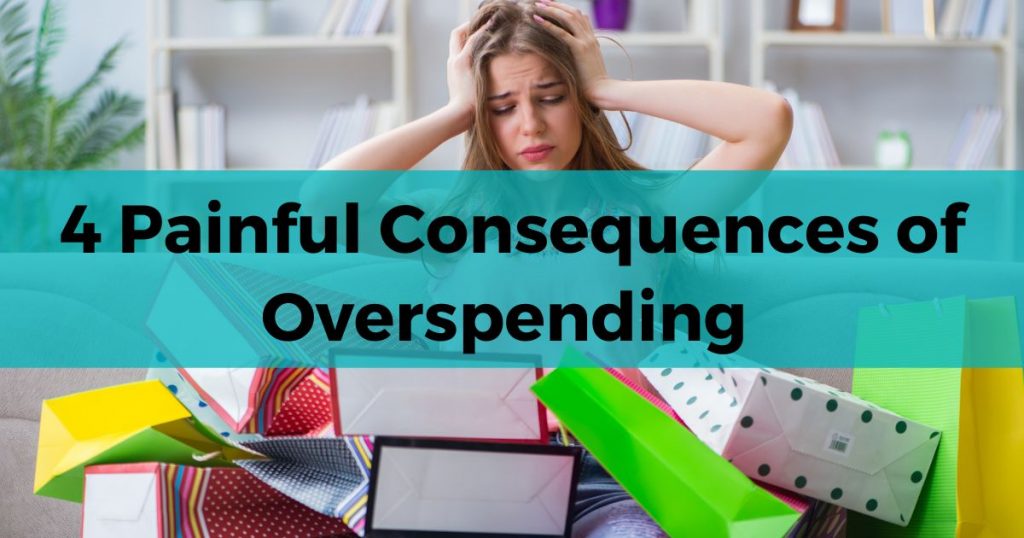
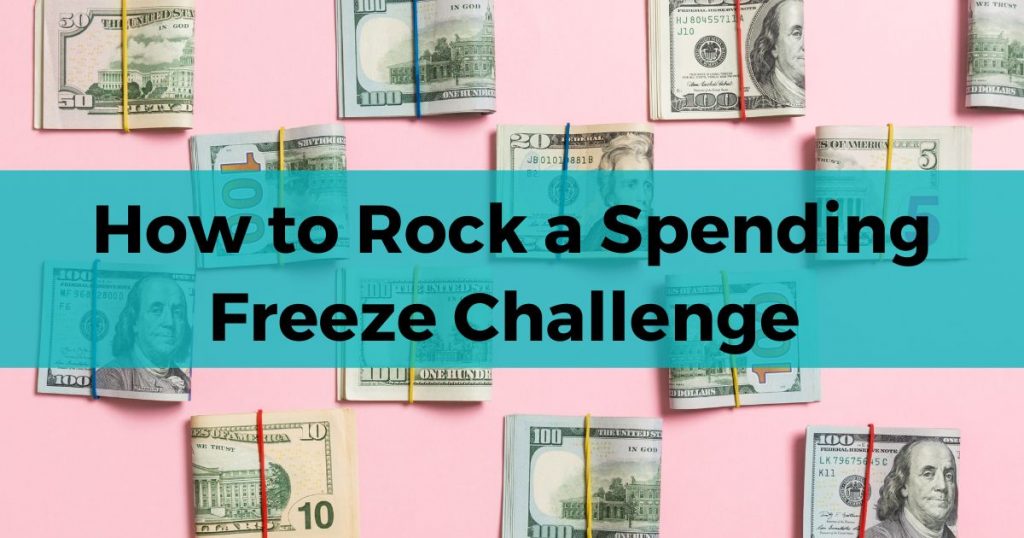
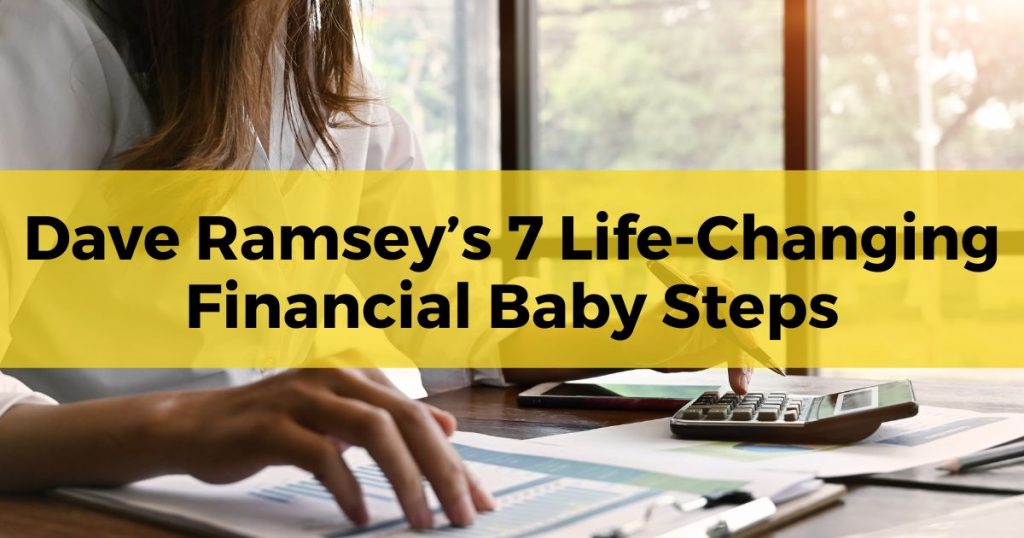


Great post! All of us have, at one time or another, fallen into debt primarily due to poor judgement. Creating a realistic budget is one of the most critical steps in developing wealth management. Thanks for the tips!
Totally agree! Thanks for reading!
Great tips at the end for how to stop overspending. I know I’m guilty of making impulsive purchases from time to time. I need to definitely work on creating a budget. Thank you for sharing!
Excellent article to avoid overspending.
Great post and tips! Now that I am retired it is much harder to save for an emergency. I did sell items on eBay and made enough money to help cover the bills, and did surveys but made less money doing that. When we had an emergency fund it saved us so many times, when something happened unexpectedly. Thank you for sharing!
An emergency fund has saved us (a couple times) from going back into debt. With the cost of everything rising, it’s so important to save for the unexpected.
I am so happy to read this. This will be helpful for so many. Simple and practical points. Thank you!
Thanks for your kind comment!
Thank you for this because it’s time we all live within our means
Absolutely agree! Too many people live beyond their means, and it causes so much financial stress.